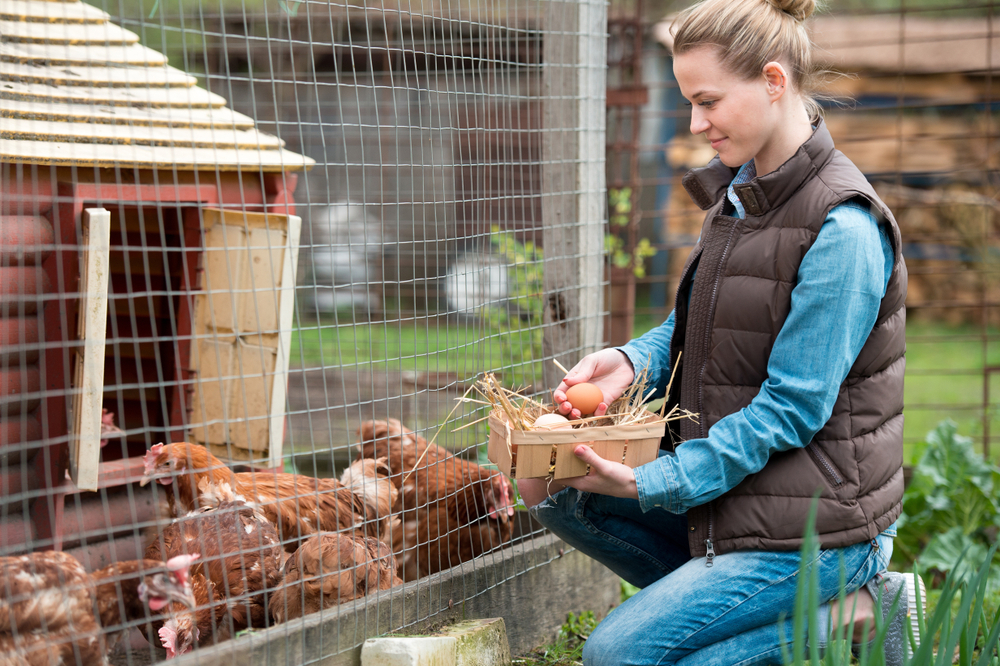A Beginner’s Guide to Raising Chickens for Eggs

Are you considering raising chickens for the first time? With resources in scarce supply these days, and with people spending more time at home than ever, the appeal of the backyard chicken is soaring. If you’re interested in raising chickens that will yield a tasty supply of eggs, here’s what you need to know to get started.
Start by Choosing the Right Breed
A chicken is a chicken, right? Actually, there’s more to it than that—there are over 50 varieties in the United States alone. What you want is a chicken that can lay lots of eggs while surviving on a foraging diet, so you don’t have to rely heavily on store-bought, non-Paleo grains or chicken feed.
While the breed that works best for you depends on where you live and what you’re looking for, two of the best egg-laying chicken breeds are the Rhode Island Red and the Hamburg.
The Rhode Island Red is one of the most popular chicken breeds, and for good reason. These chickens lay between five and six brown eggs per week and are a social and family-friendly bird. They are also excellent foragers, meaning they can live happily eating insects and seeds found in the grass.
The Hamburg chicken is another great foraging bird that will lay between three and four eggs per week. The Hamburg is a relatively small breed, so it doesn’t need as much food to keep it healthy. However, the Hamburg is known for being relatively vocal, so it might not be the best option for urban backyards.
How to Organize the Coop
There are three key things to consider when setting up the chicken coop: it must be spacious, predator-proof, and equipped with all the necessary accessories.
First, space is important. Overcrowding birds in a coop can lead to stress, inhibiting their egg-laying potential. As a rule of thumb, each chicken should have between three and five square feet of room each.
To keep predators like raccoons, coyotes, and snakes away from the chickens and their eggs, be sure your coop has sound walls that are built a few inches into the ground. This will help prevent predators from digging under the walls to enter the coop.
The door should also be secure, since raccoons are quite savvy with opening loosely latched coop doors. You might want to consider purchasing an automatic coop door that follows your flock’s foraging and sleeping schedule.
All chicken coops require accessories like a feeder, waterer, nesting boxes, and perches. Typically, one feeder and one waterer will suit a flock of eight to ten birds. There should also be one nesting box for every two birds, and a couple of roosts or perches. You can build those yourself by using two-by-four pieces of wood or a few sturdy tree branches.
Feeding a Flock
Most chickens are happy to forage their range for insects, seeds, and bits of grass. Be sure to change up the fenced area every few days to provide your flock with new, plentiful areas to explore.
While it’s easy to forage in the spring and summer, the winter months pose new challenges. If you really want to keep your chickens Paleo, gather seeds, insects, and bits of grass in the spring and summer and store them in a cool place to be fed to the chickens later in the year. However, it might be easiest to switch your chickens over to a grain diet during the colder months, especially if they are unable to gather seeds and insects early on.
3 Common Mistakes to Avoid
Picking the Wrong Breed
Some chicken varieties only yield a few eggs or require a high-protein diet heavy on grains. Be sure to do your research on which chickens best suit your lifestyle. A few questions to ask: Do they lay enough eggs? Are they friendly and quiet birds? How much do they need to eat?
Leaving Birds Confined
Be sure to give your birds enough outdoor time. They must be able to range and forage for food regularly, so they can get their exercise and stock up on nutrients.
Neglecting Their Health
If your chickens aren’t getting enough vitamins and nutrients, their eggs may be oddly shaped—or a bird may stop laying eggs entirely. You can always adjust their diet with vitamin supplements and store-bought food if you suspect your chickens aren’t at their prime health.
The Bottom Line
Although keeping Paleo-friendly backyard chickens may seem difficult, it is doable. With the right breed of chicken, the correct coop set-up, and the proper chicken-keeping practices, backyard chicken owners can expect an abundance of fresh eggs while staying true to their diet.
Chris Lesley
Chris Lesley is the Managing Editor at Chickens And More and has been raising chickens for over 20 years.
More About The Author



